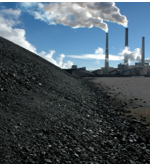INP-WealthPk
Ahmed Khan Malik
The Sindh government has decided to accelerate the long-delayed implementation of its “Coal to Gas and Coal to Liquids Policy” amid renewed progress on project execution, aiming to unlock Thar’s enormous lignite coal reserves and convert them into synthetic natural gas (SNG) and liquid fuels. The initiative seeks to reduce Pakistan’s heavy dependence on imported petroleum products and liquefied natural gas (LNG), stabilizing the country’s fuel supply and cutting its import bill.

Officials said the renewed push follows a key breakthrough achieved during President Asif Ali Zardari’s recent visit to China, where a memorandum of understanding was signed to advance cooperation on coal conversion technologies and investments. Sindh, home to Pakistan’s largest coal deposits, has long viewed the Thar desert as a strategic energy hub. The region is estimated to hold more than 175 billion tons of lignite coal — one of the world’s largest untapped reserves — with the potential to transform the country’s energy mix if efficiently harnessed. Exploiting these resources could help Pakistan achieve greater energy self-reliance, stabilize domestic fuel prices, and secure a dependable supply of gas and liquid fuels for decades.
Shariq Kazi, Director at the Sindh Coal Authority, told Wealth Pakistan that the “Coal to Gas and Coal to Liquids Policy” was originally crafted to ease Pakistan’s growing dependence on external energy supplies, but the plan faced years of stagnation due to financing delays, difficulties in technology acquisition, and bureaucratic bottlenecks. However, with global energy markets volatile and Pakistan’s foreign exchange reserves under persistent strain from surging import bills, Sindh’s decision to fast-track the initiative reflects a renewed commitment to achieving energy independence and economic stability.
Kazi explained that the policy provides a framework for turning Thar’s lignite coal into multiple high-value energy products, including synthetic natural gas, diesel, and other petroleum substitutes. Such diversification would not only reduce exposure to price swings in global oil and gas markets but also add resilience to the national economy. If executed effectively, the plan could reshape Pakistan’s industrial landscape by providing cheaper, locally produced alternatives to imported fuels. Energy-intensive sectors such as power generation, fertilizers, and transport stand to benefit significantly, easing cost pressures and improving competitiveness.
He further noted that beyond energy security, coal-to-liquids and coal-to-gas technologies could serve as a catalyst for industrial growth. Establishing processing plants in Thar and surrounding areas would help attract investment, stimulate regional development, and create thousands of jobs for skilled and semi-skilled workers in one of Pakistan’s least developed regions. “This is not only about fuel; it’s about economic transformation,” Kazi emphasized.
Credit: INP-WealthPk









